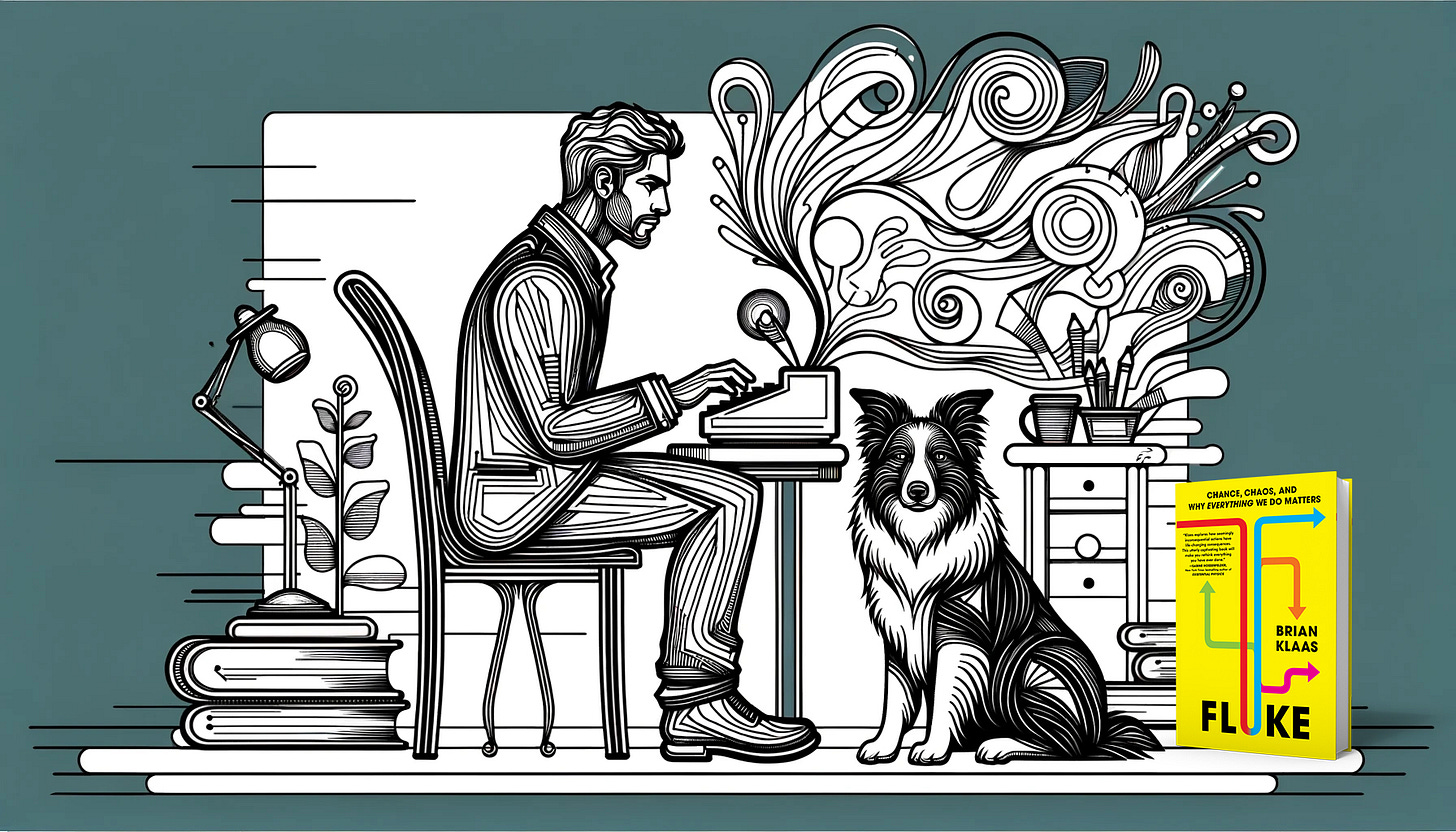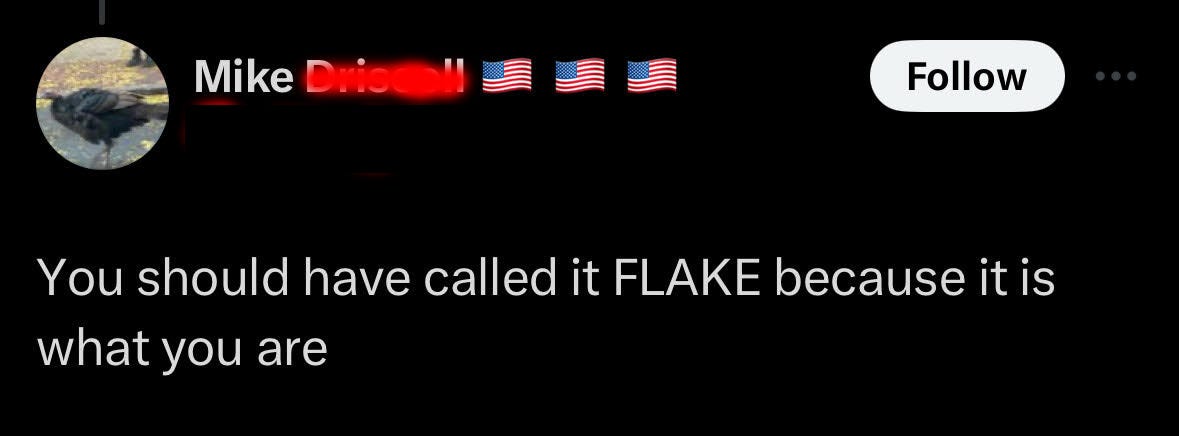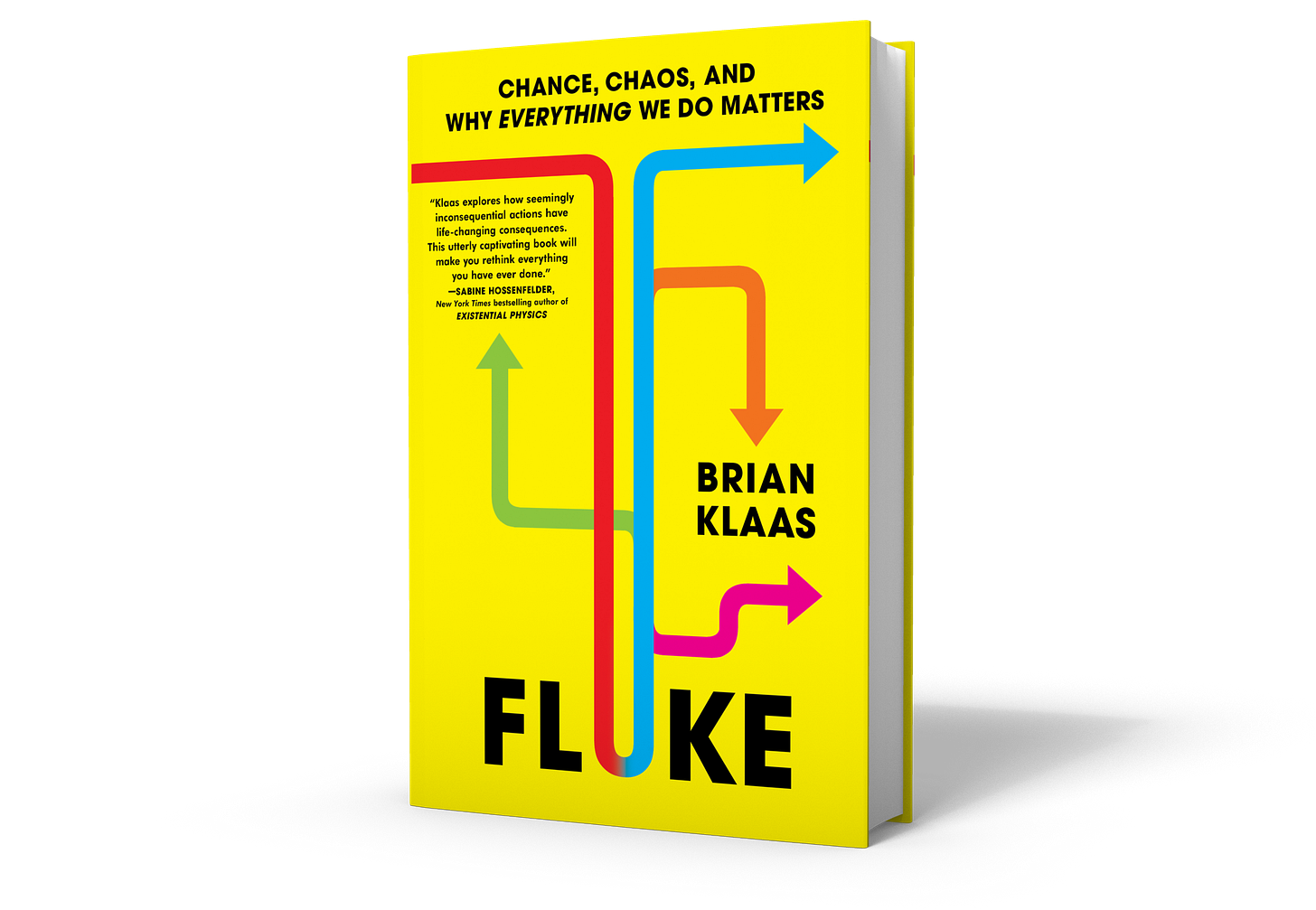Everything you always wanted to know about books (but were afraid to ask)
A few insights into the world of writing non-fiction, as my new book, Fluke, gets ready to see the world.
If you’re in London, I’ll be speaking at the London School of Economics on Jan. 29th and at University College London on February 1st. It’s free. Hope to see some of you there!
One of the greatest pleasures in my life is this: I get to take strange, captivating ideas that form in my brain, translate them into words, and zap them into your brains.
It comes with a potential downside. What if the zapping goes awry and you think my ideas are bad, or wrong, or not as captivating as I do? It’s an unavoidable risk—and one that’s inescapable in modern life—as there are ever-more avenues to tell writers that they are a worthless fool, or worse.
My favorite piece of “fan mail” started off on a lovely note—calling me “Brain” (what a compliment!)—but went sharply downhill from there.
At least he ended politely. Max, at some point, was raised right. But I digress.
The reason I mention Max’s generous feedback is because, as a few of the most eagle-eyed readers of this newsletter may have noticed, I have a book that will spring forth into the world’s bookshops one week from today.
I know I’ve been careful not to mention it too much, but if you’re a detail-oriented sleuth with a Hercule Poirot-style mind, you may have even deduced what it’s called—Fluke. (You can read the first chapter here and here, an exclusive preview for readers of this newsletter). Writing this book changed me—and how I see the world, the purpose of my life, and the nature of reality.
Not everyone likes the title.
The book’s imminent release is a delightful, but scary development. Most authors I’ve met—including yours truly—care deeply about what they’ve written. (There are exceptions: the charlatans who turn TED talks into padded out books and celebrities who use their mediocre bestselling titles to buy another Ferrari).
For all the other authors, you spend years of your life in which you wake up and think about the book…and go to sleep thinking about the book. Your conversations with friends are about the book’s ideas. It captivates you, frustrates you, consumes you.
Then, by the time the book is finished, you feel like you’ve sliced a bit of yourself off, sending that bit of you to permanently live within those pages, a more joyful, literary version of Voldemort’s infamous horcruxes.
And then…you wait.
Max usually shows up quickly.
In this edition, I have cleverly decided to kill two birds with one stone. Rick, my erudite, kind, gentle editor, told me he would confine me to the dungeon beneath the Simon & Schuster headquarters in Manhattan, feeding me scraps from the catering leftovers—forced to sustain myself on crust-less cucumber sandwiches for perpetuity—unless I reminded my devoted readers that Fluke is out next week (and AVAILABLE FOR PRE-ORDER NOW — please Rick, not the cattle prod again!)
But since that’s blatantly self-serving and self-promoting—and annoying—I figured I would also tell you a bit about the hidden world of non-fiction publishing and what it’s like to write books. Perhaps you’ll find it interesting. If not, then I, hate-filled clown that I am, eagerly await your feedback.
Question 1: Why are you—and all other authors— obsessed with pre-orders?
Great question, good sir/madam! There are two main reasons.
The first is that pre-orders function as a barometer in the publishing industry. If a book shows strong pre-sales, publishers may order a larger print run and devote more marketing resources to the book, bookshops order more copies, buzz builds, and reviews—and press features—become more likely.
Second, the best shot at making a bestseller list comes in the first week of publication. That’s because all pre-sales are lumped in with the first week of sales. So, if 1,000 people have bought your book in the months before the release, all of those count toward your first week’s figures. That gives the book the best shot to hit the bestseller lists on its debut.
Question 2: What do you actually do when writing a book? Do you just sit down, open up a Word document, and a book flows out of you?
Here, I can only speak from personal experience, as every author has a different process. Typically, I start a book by writing nothing. Instead, I read intensively for six to nine months, whenever I can find time, before I even contemplate opening a Word document to type. As a professor, it’s easier to find time to read than in some other professions, but you have to be a sponge for every drip of information, retaining bits that you might use in the text.
Sometimes, you can read an enormous amount and end up using very little, or even none at all. For example, you may recall that I wrote an edition of this newsletter about the Evolution of Modern Dogs. (It’s related to an idea around contingency that’s a theme in Fluke). I’m not joking when I say that I read three academic books about the origin of dog breeds and several more academic journal articles. I only ended up including a bit about it in the final text—amounting to 231 words, a mere handful of sentences. And that’s a better outcome than most. I read about a dozen books for research in which I ended up using none of the subject matter in the final draft.
Eventually, you open up a blank Word document and spend the first three or four days typing, only to delete everything. It’s rubbish. But after a healthy bit of toiling, you get into a rhythm. In my case, that rhythm was waking up, taking a mug of coffee to sit outside in the cool British summer, typing, as a border collie dropped a Frisbee at my feet approximately every 37 seconds.
Some days, it just doesn’t work. You write almost nothing—and what you do write is trash. It’s usually best to just do something else on those days. Other days, the words flow out of you effortlessly. I once wrote an entire chapter—about 5,000 words—in one day, and it was virtually identical to the final draft.
The editing process is always tough. You have to kill off many words that you like, to respect the reader’s time. Every word must earn its place. The first full draft of Fluke that I showed my editor was 20,000 words longer than the final draft. Enough said.
Question 3: Wait, back up: how do you actually get a book deal?
Answering this requires a bit of background knowledge about the publishing industry. There are basically three kinds of nonfiction books.
Academic: these are the books written by academics, for academics. Often filled with fascinating ideas, but not particularly accessible for non-specialists. You might make no money—literally zero dollars—and the books often cost upwards of $80+ for a hardcover, because most of the buyers are libraries.
Academic/Trade: These books are often with academic or semi-academic presses, but are aimed at brainy readers who aren’t academics. My first three books were with these publishers (Oxford University Press, Yale University Press, and Hurst & Co). It’s a good place for professors writing nonfiction to break into writing for the general public, but the money isn’t great. (Even though my first three books sold well by the standards of academic/trade books, I made a grand total of $6,000 from the first three books—an average of $2,000 apiece).
Trade publishing: Most of the time you go into a bookshop, you’re seeing trade books. This world is dominated by the Big Five publishers: Penguin Random House, Hachette, HarperCollins, Macmillan, and Simon & Schuster. (In the US, my publisher is Scribner, an imprint of Simon & Schuster; in the UK, my publisher is John Murray, an imprint of Hachette. Fun fact: John Murray published On the Origin of Species in 1859).
The reason I mention this breakdown is because the pathway to getting a book deal is different for each kind of publishing. In the academic world, you have to write the entire book first, then pitch it to an academic press and hope that they’ll agree to publish it. (This is awful for some researchers, who write an entire book, and it never gets published).
For academic—and academic/trade—you don’t need an agent to sell the book onto the publisher. You can approach them directly. Some people still may use agents, but it’s not required.
For trade publishing, you must have an agent. That creates two gatekeepers.
You first need to convince an agent that you’re worth the investment of their time. They’re going to try to get you a deal, but they don’t make any money unless you make money, so they have an incentive to only represent an author if they’re pretty sure the work will sell. Moreover, if agents keep pitching bad ideas to publishers, the publishers will start ignoring that agent’s pitches, so there’s a strong incentive for agents to be selective.
Second, a publisher needs to want to buy the book from the agent. For nonfiction, books are sold on proposals, which often include an overview, a sample chapter, a detailed chapter outline, and a proposal that indicates why the book might have an audience. If you’re Yuval Noah Harari—the author who wrote the runaway bestseller Sapiens—well, you’re now going to get a book deal no matter what. But if you’re less well-known, or you’re writing about a topic that’s more obscure, or you’re unlucky, it can be an uphill battle.
When I was finishing my doctoral research, I got an agent for what I thought would be my first book. The agent pitched my proposal. Nobody wanted to buy it.
So, I waited another year, pitched it directly to a smaller academic/trade publisher, and it finally worked out. (JK Rowling was rejected by 12 publishers when she first pitched Harry Potter; this time, violating superstition, the 13th, Bloomsbury, was the lucky one. The editor bought the rights to Harry Potter for £2,500 ($3,180), in what must have been one of the greatest returns on investment in human history).
A lot of bad books easily get agents because the writer has an established profile. A lot of amazing books never get published. Such is the reality of the publishing industry.
Question 4: How does it work with titles, subtitles, and cover design?
Oh no! You’ve re-opened a raw wound by asking this question, dear reader.
Titles, subtitles, and cover design are incredibly tricky, time-consuming, and difficult to get right. You need something that captures the book, but condenses it into a few words. You also need a title and cover that grabs attention in a bookshop where thousands of other books are competing for that attention. For both Corruptible—my last book—and Fluke, there was an endless flurry of debate, about 30,000 words of e-mail correspondence over the title, subtitle, and cover design. You overthink it. And nobody actually knows what will work best, so you’re arguing over guesswork.
It’s a delicate dance between editors, the publicists (the people who market the book), agents, and authors. I’ve never had an experience where everyone has agreed. That makes sense; books are subjective works of literary art, but they also need to be marketable, so there’s an inbuilt tension within each one.
Here was the initial cover design suggestion for Fluke, with a different subtitle (the fake quote was a placeholder for the designers to visualize what it might look like).
I suggested some changes. “We need more forking paths,” I said — see what I did there — and the final version eventually emerged, with the brilliance of a wonderful designer.
Question 5: What determines whether a book succeeds or not?
Nobody knows. Okay, there are some factors that make it more likely. It helps if the author has an established platform—Michelle Obama’s book was always going to sell a lot of copies. But beyond that, there’s a lot of guessing and gambling in the publishing industry.
Why, for example, did Sapiens sell so many copies? Or how about Guns, Germs, and Steel? It’s hard to say. Was the world crying out for a dense, lengthy nonfiction book by an ornithologist about why geography matters? Who knows. It’s not that those titles didn’t deserve it, but rather that there are a lot of great books, and only a few sell millions of copies. It’s impossible to guess which will break out.
But you do need a critical mass to have a shot at a breakout book. Word of mouth only works if some people know the book exists. And that requires some level of public outreach, a public platform for the author, a good publicist, or a mixture of all three.
I’ve written previously about the risks of following what I call the “surefire mediocre” strategy. Many books published these days unfortunately fit that label. But for others, before a book actually gets published, it’s pretty hard to predict whether it will take off, or flop. And flops can matter a lot. It’s not just that the book itself flops—that’s bad enough—it’s that the author might not get another chance to write another book because they start to be seen as someone who produces books that flop. Future writing can dry up and careers can end.
Such unpredictability, while terrifying, can also be comforting. You can’t control it—so why worry too much? Take your best shot, and hope it works out. That’s pretty good advice for life that also turns out to apply pretty well to publishing.
I took my best shot with Fluke—and hopefully some of you will like it. Though I’ll admit, I’m not holding my breath for a positive review from my dear friend Max.
—Brian
Fluke: Chance, Chaos, and Why Everything We Do Matters is available everywhere books are sold on January 23rd in the United States and February 1st in the UK and beyond. Please consider supporting your local bookshop. The audiobook version will be out on January 23rd as well—and it’s read by me. If you’d like to support my writing, read some interesting ideas that might make you think a bit differently about the world, and save me from crust-less sandwiches in a dungeon, please consider giving your future self a gift by ordering Fluke now.








